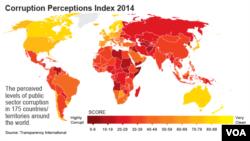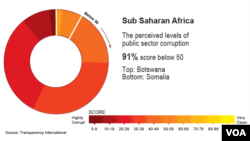North Korea, Afghanistan and several East Africa nations again rank among the countries perceived to be the most corrupt, according to an annual report by the better governance group Transparency International.
The 20th “Corruption Perceptions Index” released Wednesday by Transparency International (TI) ranks 175 countries on a scale of 0 to 100 showing "corrupt" to "clean."
The bottom five on the index are concentrated in East Africa. Somalia came in last, closely followed by Sudan and South Sudan. Sharing the bottom with them are North Korea – second to last – and Afghanistan.These states have few anti-corruption laws, and what does exist is poorly enforced.
The Scandinavian countries and New Zealand come out on top in the 2014 tally. For the third year in a row, Denmark is the No. 1 country. These nations have tough laws and regulations on transparency, both in government and commerce.
Ivory Coast, Egypt, Jordan, Mali and several other states scored notable improvements in the rankings. But China, Turkey and Angola were among those that fell.
"Countries at the bottom need to adopt radical anti-corruption measures in favor of their people," said Transparency International Chairman Jose Ungaz, who added that "countries at the top of the index should make sure they don’t export corrupt practices to underdeveloped countries."
A few near the bottom of the list showed notable improvement. Afghanistan’s rank – 172 out of 175 – was only slightly better than a year ago, when it tied for last with North Korea and Somalia. The United States has spent more than $100 billion reconstructing and improving Afghanistan since 2001, when the Taliban regime was ousted.
Iraq was ranked 170th on the index – one place higher than in 2013. Since the 2003 Iraq War, the United States has spent more than $60 billion rebuilding that country and trying to create an inclusive, nonsectarian government.
China's rank falls despite anti-corruption effort
China, despite President Xi Jinping's anti-corruption campaign, fell notably in the latest Transparency rankings. China was tied for 100th position with Algeria and Suriname. The Chinese score on the 100-point scale fell significantly, from 40 last year to 36.
Earlier this year, 22,000 Chinese nationals, including some in leadership positions, were reported to have secret offshore bank accounts. Eight Chinese companies included in a Transparency International study of corporate disclosure practices all scored poorly in this regard.
Many observers said Xi’s campaign is actually meant to drive his political opponents from positions of power. Former Domestic Security Chief Zhou Yongkang and those surrounding him are reported to be special targets of the initiative.
US ranking improves slightly
The United States, ranked 19th last year, scored 74 points and tied for 17th place with Barbados, Hong Kong and Ireland. That puts it behind Canada (10th), Germany (12th), Britain (14th) and Japan (15th).
Transparency International said "one highly plausible explanation" for the relatively low U.S. ranking is "the murky nexus between money and politics in all levels of United States' governments."
It pointed to the recent corruption trial of the former governor of the mid-Atlantic state of Virginia and Supreme Court decisions that have made it easier to make massive, often hidden, cash donations to political campaigns.
"While political corruption is a problem in all countries," the report said, "it is notable that many of the countries that score higher than the United States on the Corruptions Perceptions Index impose donation and/or expenditure limits on political campaigns."
Africa and Asia
In sub-Saharan Africa, Botswana was the bright spot, ranking 31st. Other states in the region ranked lower – Lesotho, Namibia and Rwanda share 55th place, while other African states were farther down the list.
Nigeria was at 136th, along with Russia, Lebanon and Kyrgyzstan. The Democratic Republic of Congo came in 154th, two positions ahead of Zimbabwe, at 156th.
Ivory Coast’s ranking at 115th is a big move upward from last year, when it was 136th. Legislative changes and stronger enforcement are factors attributed to its improvement.
In the Asia Pacific region, Taiwan came in 35th, while South Korea was ranked 43rd. The Philippines shared 85th place with India, Jamaica and Peru, while Indonesia was ranked 107th. Vietnam was 119th, and Laos was 145th.
The Transparency report noted that in many countries, a significant level of transnational money is being channeled to places such as Cyprus, where massive sums of Russian cash are banked, and Mauritius, which TI said is a favorite hiding place for Indian wealth.
Transparency International has repeatedly called for stronger international agreements monitoring cross-border cash flows, including measures compelling banks to reveal the identities of account holders.
The group also said a main source of corruption is the ability of so-called shell corporations to hide and move funds in a way that obscures ownership and responsibility. Because of that, it said, there must be international registers of corporations and those who own and control them.
"Grand corruption in big economies not only blocks basic human rights for the poorest, but also creates governance problems and instability," said TI chairman Ungaz. "Fast-growing economies whose governments refuse to be transparent, and tolerate corruption, create a culture of impunity in which corruption thrives."







